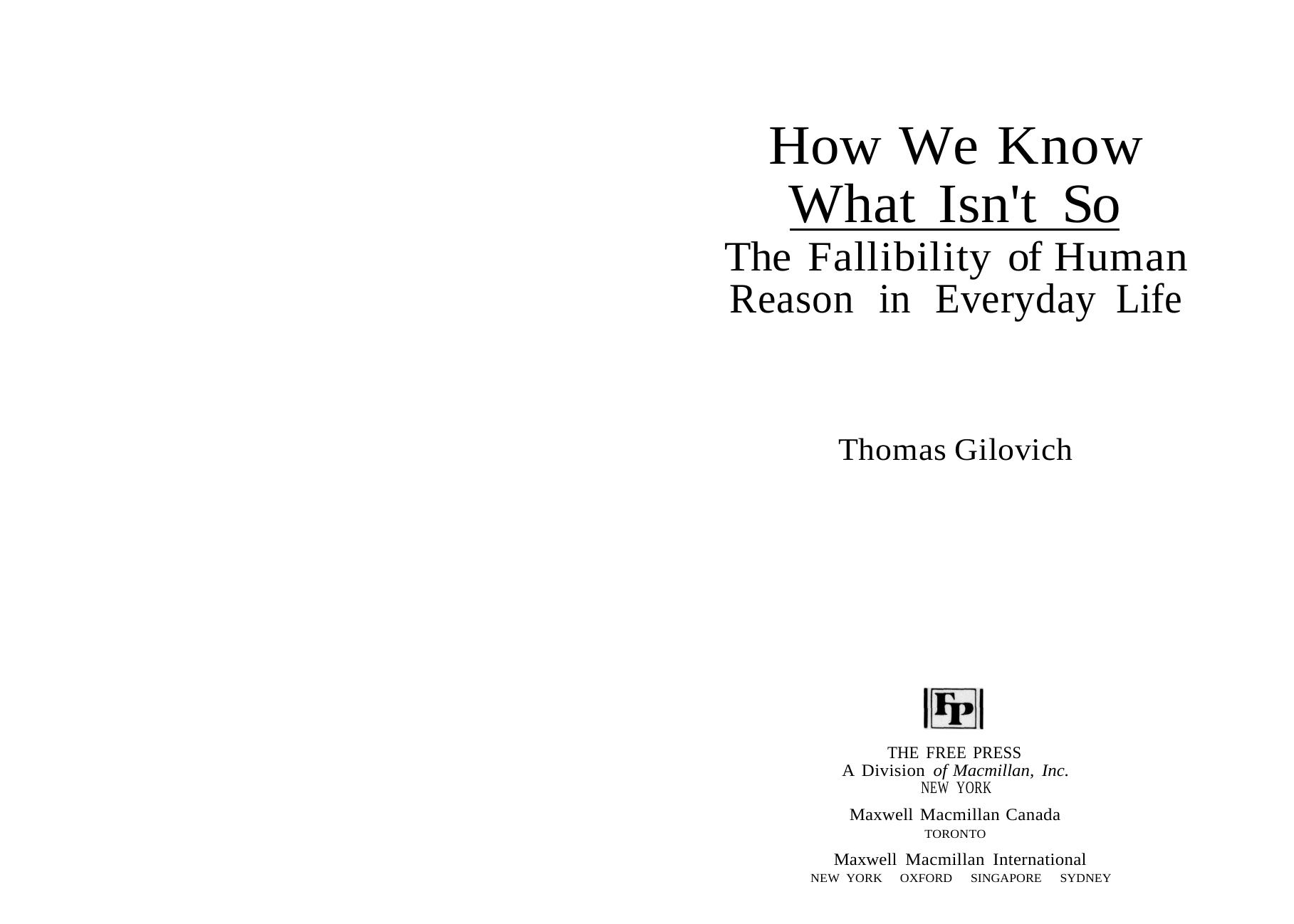How We Know What Isn't So: The Fallibility of Human Reason in Everyday Life by Thomas Gilovich

Author:Thomas Gilovich
Language: eng
Format: mobi, pdf
Tags: Developmental, Psychology, Cognitive Psychology, Critical Thinking, Fallibility, Philosophy, Evidence, Child, Fallacies (Logic), Logic, Error, Rationalism, Social Psychology, Personality, Judgment, Reasoning (Psychology), Movements
ISBN: 9780029117064
Publisher: Free Press
Published: 1991-01-02T05:00:00+00:00
7
The Imagined Agreement
of Others
Exaggerated Impressions of Social Support
My opinion, my conviction, gains infinitely in strength and success, the moment a second mind has adopted it.
Novalis
What we believe is heavily influenced by what we think others believe. We favor or oppose experimentation with sex, drugs, and various other “lifestyle” practices in part because of what we think other people think, or do, about these matters. We consider a theater production to be worthy or unworthy of our attendance partly by the number of people who line up to see it. When asked at the office to donate money for a “going-away” gift for someone, we usually try to find out how much others have given and then decide our own contribution accordingly.
Within limits, this tendency to let the beliefs of others influence our own beliefs is perfectly justified. What other people think and how other people behave are important sources of information about what is correct, valid, or appropriate. Other things being equal, the greater the number of people who believe something, the more likely it is to be true; the more people who do something, the more we are well-advised to do the same.
Unfortunately, our ability to utilize effectively the opinions of others as an important source of indirect information about the wisdom of our actions, or the validity of our beliefs, is compromised by a systematic defect in our ability to estimate the beliefs and attitudes of others. We often exaggerate the extent to which other people hold the same beliefs that we do. Because our beliefs appear to enjoy more social support than is actually the case, they are more resistant to change than they would be otherwise. Thus, our difficulty in accurately estimating what other people think represents an important determinant of the maintenance of erroneous beliefs.*
Download
How We Know What Isn't So: The Fallibility of Human Reason in Everyday Life by Thomas Gilovich.pdf
This site does not store any files on its server. We only index and link to content provided by other sites. Please contact the content providers to delete copyright contents if any and email us, we'll remove relevant links or contents immediately.
The Art of Thinking Clearly by Rolf Dobelli(8876)
Mindhunter: Inside the FBI's Elite Serial Crime Unit by John E. Douglas & Mark Olshaker(7854)
Change Your Questions, Change Your Life by Marilee Adams(6667)
Nudge - Improving Decisions about Health, Wealth, and Happiness by Thaler Sunstein(6645)
Mastermind: How to Think Like Sherlock Holmes by Maria Konnikova(6259)
The Power of Now: A Guide to Spiritual Enlightenment by Eckhart Tolle(4777)
Men In Love by Nancy Friday(4348)
Factfulness: Ten Reasons We're Wrong About the World – and Why Things Are Better Than You Think by Hans Rosling(4033)
The Confidence Code by Katty Kay(3577)
Thinking in Bets by Annie Duke(3542)
Man and His Symbols by Carl Gustav Jung(3331)
The Worm at the Core by Sheldon Solomon(2931)
Three Women by Lisa Taddeo(2927)
Why Buddhism is True by Robert Wright(2837)
Liar's Poker by Michael Lewis(2823)
The Inner Life of Animals by Peter Wohlleben(2778)
Descartes' Error by Antonio Damasio(2748)
The Power of Mindful Learning by Ellen J. Langer(2718)
The Slow Fix: Solve Problems, Work Smarter, and Live Better In a World Addicted to Speed by Carl Honore(2580)
